Michigan's next big job opportunity: growing agricultural industry?
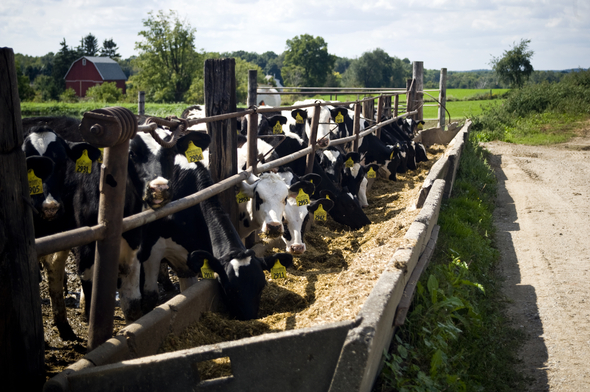
A symbol of Michigan's booming agricultural industry, Manchester's Horning Farms owns about 750 to 800 dairy cows and calves. On any given day, about 330 are milked, producing an average of 10 gallons a day.
Joseph Tobianski I AnnArbor.com
When a million-dollar machine started milking his dairy cows, measuring output and spitting out data analyzing daily production trends in the early 1990s, Manchester farmer Earl Horning knew farming had changed.
He’s still waiting for the agricultural industry — Michigan's fastest growing major industry over the last decade — to shed its image as a bad place to work.
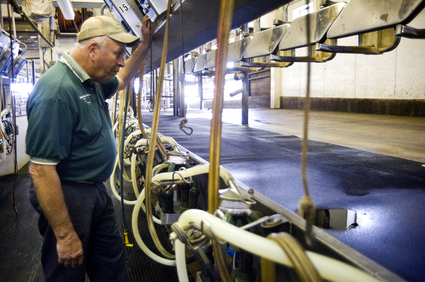
Earl Horning, whose family has owned the 650-acre Manchester farm for six generations, stands in the milking station where cows' teats are connected to a million-dollar machine that uses software to monitor production outputs and potential health problems.
Joseph Tobianski I AnnArbor.com
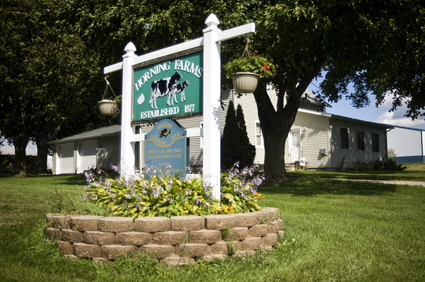
The 650-acre Horning Farms employs about eight full-time staff members in addition to the families of Earl and Jeff Horning. The farm also employs many different contractors, a contingent of seasonal migrant workers and others.
Joseph Tobianski I AnnArbor.com
“You don’t have to be a farmer to be involved in the industry,” Horning said during a recent interview at his sixth-generation, 650-acre farm on Pleasant Lake Road. “The agricultural community itself has lots of opportunities, all the way from manual labor to the highest tech programs.”
That’s a message Michigan’s agri-food industry is desperate to communicate because the industry is surging as farmers benefit from a global uptick in food prices and as Michigan consumers buy more local products.
But the industry’s growth is threatened by a failure to recruit young talent, according to a new report by the Michigan Agri-Business Association.
Michigan’s 56,014 farmers sold $5.75 billion in products in 2007, up 52.5 percent from 2002, according to the U.S. Department of Agriculture’s 2007 farm census. Much of that growth is driven by foreign markets as exports surge — a trend that's likely to continue after Congress on Wednesday passed free trade agreements with South Korea, Colombia and Panama.
But a Michigan Department of Agriculture and Rural Development study describes the broader agri-food industry as much larger — about $71.3 billion in direct and indirect economic activity, reflecting the trickle-down effect of a healthy agricultural community, which affects grocers, restaurants, local sellers, farm contractors, food processors and others.
Although agricultural subsidies are a divisive political issue in Washington, their role in Michigan's farm industry is declining. Michigan farmers got $118.9 million in government subsidies in 2007, down 18 percent from 2002, according to the Michigan Department of Agriculture and Rural Development.
To be sure, many jobs on the farm still involve long hours and low pay. Salaries vary wildly based on the position.
Farmworkers who handle livestock and ranch animals are paid average salaries of $23,980, according to the Michigan Department of Technology, Management and Budget. Farm laborers are paid an average of $22,510.
But other industry workers are paid more, like agricultural inspectors ($53,640), farm purchasing agents ($64,750), agricultural engineers ($72,720) and farm managers ($69,720).
Washtenaw County — generally known to the rest of the state as a source of technological innovation because of the University of Michigan and a burgeoning entrepreneurial economy — also has a vibrant agricultural sector.
The county’s 1,300 farms sold $73.2 million in products in 2007, up 34 percent from 2002, ranking 29th among Michigan’s 83 counties. Washtenaw has the most sheep, lamb and horse operations.
The surge in Michigan’s agri-food industry is a recent phenomenon — which may help explain why many consumers don’t view it as a source of new jobs.
Agricultural jobs
Workers with experience in traditional industries like manufacturing, construction and engineering can often translate their skills to the agricultural industry.
Here are 5 agricultural jobs with translatable skills (and median salaries):
- Farm equipment engineers and agricultural research engineers: Engineering farm equipment, analyzing soil and water usage, examining processing procedures ($72,720)
- Farm product purchasing agents: Procuring products such as cotton and livestock for processing or resale ($64,750)
- Fence builders and installers: Constructing or repairing fences ($33,570)
- Agricultural equipment operators: Driving farm equipment, cultivating soil, harvesting crops, operating applicator machines (wide salary range)
- Bus and truck mechanics and diesel engine specialists: Diagnosing and repairing farm vehicles ($40,010)
From 1969 to 2000, Michigan lost 30,300 farming jobs as global competition intensified, according to a 2010 report by MSU's Land Policy Institute.
That decline has reversed in recent years as local farmers found new markets for their products, including foreign countries, local grocers and local consumers.
From 2002 to 2007, the market value of crops sold by Michigan farmers rose by 52.5 percent. During the previous 10 years, the market value of Michigan crops rose only 24.4 percent, according to the Michigan Department of Agriculture and Rural Development.
Hiring challenges
All of a sudden, the sector is growing and hiring — which recently led the East Lansing-based Michigan Agri-Business Association to take the unusual step of issuing a report acknowledging that the industry has an image problem.
Although the industry is booming, it’s also aging — and it threatens to slow the industry’s growth.
About 30 percent of the industry’s managers are expected to retire within five to 10 years, according to the Michigan Agri-Business Association. Their average age is 56.3, according to the Michigan Department of Agriculture and Rural Development.
“Their replacements must be found quickly to avert a vacuum in leadership and skills that could hold back the entire industry,” according to the report.
Michigan Agri-Business Association President Jim Byrum said the industry’s recruiting challenges start with a basic misunderstanding.
“A lot of folks don’t think about ag when they think about job opportunities, but we were the fastest growing segment of Michigan’s economy in the last decade and probably will be in the next decade, so it’s a pretty positive story,” he said.
First, Byrum said, jobseekers need to understand that the industry is diverse and high-tech. In fact, most agri-food job opportunities aren’t even on the farm. Michigan had about 56,000 “principal operators” of farms in 2007. Generally, their families work on the farm, too.
But the economic impact of the agricultural industry is amplified by the many people required to support a farm, such as truckers, machine technicians, various specialists, maintenance technicians and manufacturing companies.
As farmers flourish, they hire more specialists like Duane Kimpel, an Ohio resident who visits Horning Farm with an assistant to trim cow hooves once a month.
"For a large part of society, they would never see themselves working on a farm," said Jeff Horning, who runs the farm's day-to-day business. "There’s so many things on a farm that happen. It’s not the same thing every day. We do have specialists come here."
And, of course, farms generate jobs at local grocers and restaurants that are flourishing because of their focus on locally grown products.
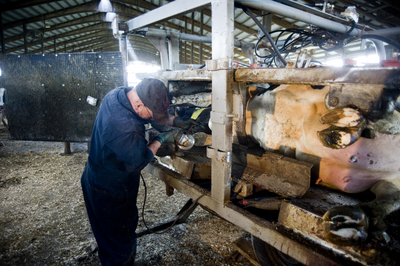
Horning hires hoof-trimming specialist Duane Kimpel of Ohio to visit the farm once a month. The farm's cows get their hooves trimmed about twice a year.
Joseph Tobianski I AnnArbor.com
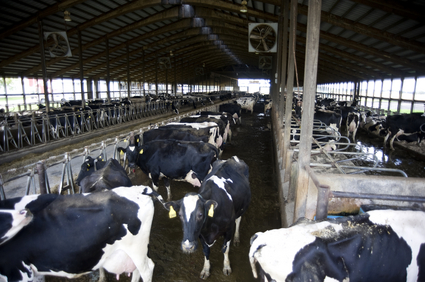
Horning Farms milks cows six days a week from 4-9 a.m. and 4-9 p.m.
Joseph Tobianski I AnnArbor.com
Byrum said sales people are needed to market products and sell farm technology like crop protection systems, positioning farmers to expand their market presence.
“We can teach them ag, but they need to be able to talk to people and have great communication skills,” Byrum said.
The industry needs skilled workers capable of handling advanced pesticide applicator machines, soil scientists, grain elevator operators and truck drivers in the most rural parts of the state.
Central to the recruitment challenge is a difficulty in convincing young people to consider the industry as a place to work.
Groups like Ann Arbor-based think tank Michigan Future Inc. have pumped out numerous studies showing that Michigan’s top college graduates prefer to work in vibrant urban areas.
The Michigan Agri-Business Association acknowledges the dilemma.
For a lot of young people, it’s “a matter of the quality of life, including entertainment, socialization with peers of a similar background and experience, fast and reliable Internet access (broadband), proximity to cultural activities,” according to the industry’s report.
But the industry is not just having a hard time recruiting young people. Byrum said the industry is even having trouble recruiting laid-off manufacturing employees in the state’s most distressed urban areas.
“That’s why we’re reaching out as strongly and aggressively as we are,” he said. “Ag used to be viewed as a dirty, dusty occupation, and it’s not that way anymore for the most part.”
Horning, who co-owns his Manchester farm with his son, Jeff, said most farmers are using high-tech equipment to maintain their crops and livestock and using the Internet to monitor price trends.
The Horning farm owns about 750 to 800 cows and calves and grows about 600 acres of crops — corn, alfalfa and wheat — that are grown to feed the animals.
At any given time, 330 are milked twice daily in Manchester, and another 200 are sent to a farm in Chelsea to be milked due to limited space in Manchester. The rest are too young to produce milk or are resting.
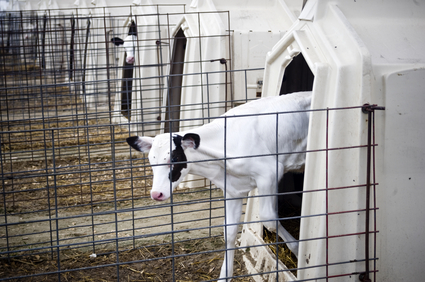
Calves like this one at Horning Farm can't be milked until they've given birth to a calf of their own.
Joseph Tobianski I AnnArbor.com
From 4-9 a.m. and 4-9 p.m., the cows are milked. Two workers guide about 20 cows at a time into a high-tech milking station. The workers connect the cows’ teats to the million-dollar Bou-matic ProVantage IMS, and the machine milks the cows.
After each session, the machine’s software analyzes each cow’s production and tells the workers if there appears to be a health issue with one of the animals.
Yes, the days of milking cows by hand are long gone.
Horning said the farm is proud to say it produces an average of about 10 gallons of milk per cow every day.
“That’s very high,” he said.
Although machines do most of the work, the realities of farm life can be jarring for people not used to the workload.
There’s not as much manual labor as there was a century ago, but the Michigan Agri-Business Association acknowledged in its report that working the field can still involve “long hours” and a “lesser skill set.”
Many local farms, including the Horning farm, hire seasonal migrant workers and immigrant workers to fill those jobs.
But many have a hard time finding people to take those positions, according to the Michigan Agri-Business Association report. “The dairy, pork, poultry, fruit and vegetable industries in Michigan need people to harvest their crops and care for their animals. While many are critical that immigrant and migrant populations fill many of these jobs, it is not because they are low-wage positions with poor benefits,” according to the report.
Michigan agricultural facts and statistics
- Michigan farmers produce more than 200 products at 56,000 farms with about 10 million acres of farmland.
- 71.3 percent of Michigan farms are between 10 and 179 acres.
- 74.2 percent of Michigan residents say the agricultural industry is "very important" to Michigan's economic recovery, while 22.8 percent say it's "somewhat important."
- Michigan farmers sold $5.75 billion in products in 2007, up from $3.77 billion in 2002 and $3.03 billion in 1992.
- Farmers sold $37.3 million in products directly to consumers in 2007.
- Dairy is the largest segment of the Michigan agriculture industry.
- Farms sell 2.7 billion eggs a year for $211.5 million.
- The Michigan floriculture industry's 720 commercial growers sold $393.5 million in products in 2007.
- Michigan is the nation's largest producer of tart cherries, blueberries, cucumbers, squash and black beans, among other products.
- Michigan's grape and wine industry, including 70 wineries, had 5,400 employees in 2007.
- Farmers exported more than $1.6 billion in goods.
- Michigan has the fourth most farmer's markets in the U.S.
- 47,739 of Michigan farms' "principal operators" are men. 8,275 are women. Their average age is 56.3. 30 percent plant to retire within 5 to 10 years.
“Many of these operations provide health care and other benefits, while paying well above the minimum wage. It has simply been very difficult, if not impossible, to find workers locally to do these jobs on a reliable basis.”
Business opportunity
The agricultural industry has become lucrative for many. In 2010, Michigan farmers, in aggregate, made a profit of $1.82 billion, averaging more than $33,000 per farm, according to the USDA's Economic Research Service.
At the Horning Farm, which has eight full-time employees in addition to the Horning family members and many contractors, the performance has been strong, though Earl Horning declined to offer details.
One misconception about local farmers is that the entire industry is run by major corporations. In reality, Michigan’s farming industry is dominated by families.
About 4.3 percent of Michigan farms reported sales of more than $500,000 in 2007, though that was up from 2.5 percent in 1997, according to the USDA. Individuals or families own 86.9 percent of Michigan’s farms, while non-family corporations own 0.4 percent.
At the same time, Michigan agricultural exports have more than doubled over the last half a decade, rising to $1.75 billion in 2010, according to the Michigan Department of Agriculture. But small, family-owned farms often need help to pursue foreign markets.
The Michigan Economic Development Corp. and Michigan Department of Agriculture and Rural Development say that building infrastructure to support the expansion of agricultural exports offers an economic opportunity for the state. Exports of soybeans, feeds, grains and wheat are growing particularly fast.
Training Michigan’s workforce to fill the various job opportunities within Michigan’s agri-food industry must involve a number of players, the industry says.
Michigan State University is still the state’s top destination for agricultural education — and most managerial positions in the industry require a college degree.
But the Michigan Agri-Business Association says community colleges also need to get involved in training workers for industry jobs.
Workforce development agencies are also moving to provide resources to jobseekers interested in pursuing jobs in the agri-food industry.
Mary Jo Callan, community development director for Washtenaw County, said her office is developing an initiative to provide a new job training program to prepare people to enter the industry.
“We’re trying to provide some comprehensive job development training and opportunities for low-skilled, low-income folks, folks who have traditionally been left out of traditional workforce development efforts,” she said.
She added: “The reality is that the local food movement and the farm-to-table movement has really reshaped people’s perception about agriculture and about local food systems. So, is it hard work? Hell yes. But is it worth it, is it important work, is it work people can feel proud about? Yes it is.”
Contact AnnArbor.com's Nathan Bomey at (734) 623-2587 or nathanbomey@annarbor.com. You can also follow him on Twitter or subscribe to AnnArbor.com's newsletters.


Comments
Breastfeeding is Best
Fri, Oct 14, 2011 : 9:17 p.m.
Yes, cows get uncomfortable when they are overdue for a milking, and the more cows are milked, the more they produce. I don't & have never worked on a farm, but I know these things because I successfully breastfed my children as infants. A mammal is a mammal, regardless of whether you are a human or non-human animal. For most women, the body produces the amount of milk a baby needs, so to hear that high-tech equipment is being used to get 10 gallons of milk from each cow a day makes me cringe as a breasfeeding mom (especially when they are only getting milked twice a day). While the farm might be proud of this, this is not what's in the best interest of a lactating mom. I hope everyone out there who drinks milk and/or consumes dairy products realizes that the purpose of cow's milk is to feed a calf. Exactly like a human mother breastfeeds her baby, a mother cow produces milk to breastfeed her baby as well. Cows don't automatically produce milk just like women don't. It's the process of giving birth that allows this to happen. And, when it happens, it is meant for her baby. How is the calf being provided milk in this situation? Might it want to nurse from its mother? One has to question what happens to the cow when it can no longer produce milk (because it is too old to become impregnated). What happens to the unwanted male calves who cannot become dairy cows themselves? One must realize that supporting dairy farms in essence supports the veal industry. It's a complete shame that 600 acres of crops are grown to feed the animals. Instead of growing the food to feed the animals which in turn feed the humans, why not take the animal out of the equation and just feed the crops to the humans? Seems like that would be an effective business model. Last I checked cows were not meant to eat corn, alfalfa, or wheat. They are ruminants & require a diet of grass. Please make sure you choose only grass-fed products (both beef and dairy).
Anita
Tue, Jul 17, 2012 : 7:39 a.m.
My character count was not over the maximum, but they cut me off in an inopportune place! Here's the end: (I) suggest getting to know a farmer or reading farmers' blogs. In paragraph 4, grain is the source of the energy that animals need. According to animal scientists who have done the research and cranked the numbers, grassfed animals are less kind to the environment than the more productive animals that get some grain.
Anita
Tue, Jul 17, 2012 : 7:24 a.m.
Where did you see that "cows were not meant to eat corn, alfalfa or wheat?" If you want to learn about agriculture, please skip that source. Cattle have been eating those plants for thousands of years. They still eat grass now. Yes, cattle are ruminants, so farmers feed roughages (feeds high in fiber, low in digestible nutrients & low in energy--including hay, straw, silage, haylage, pasture & more). Hay can be alfalfa, ryegrass, sudan grass, triticale, timothy, birdsfoot trefoil, clovers, vetches & more. Several of those plants, including wheat & corn, ARE grasses. Cattle eat the entire corn plant, not just shelled corn. Beef animals spend most of their lives on pasture. Grain is added only to finish them. My brother balances his dairy cows' diet by computer every single day. Roughages, protein (usually soybean meal or cottonseed meal), grains, vitamins & minerals are weighed precisely & mixed according to the needs of a group of animals (grouped by age, size, stage of lactation, stage of pregnancy, production level) every day. I don't know any human who eats exactly what they need for optimal health every day, but cows do. Most dairy farmers work with a professional livestock nutritionist. I don't know anybody who gets advice from a nutritionist their entire life. Dairy cows are checked by a veterinarian every month. (Between monthly checks, the vet visits when an animal is sick.) Who goes to a doctor every month? We monogastrics cannot digest all the feeds ruminants eat. That's where your suggested business model doesn't work. Crops are grown where they grow best (e.g., cotton in the South, corn & soybeans in the Corn Belt). Often land used to grow feed for livestock is marginal land that can't produce other crops productively. Getting the most we can from every acre helps prevent loss of more rainforests. It's not as simple as some people want you to think. I commend you for wanting to learn & suggest getting to know a f
djacks24
Fri, Oct 14, 2011 : 9:59 p.m.
That's fine, when you're not living on tight budget...
leaguebus
Fri, Oct 14, 2011 : 6:41 p.m.
We need trained Ag specialists to work for $25K per year. Our forward looking governor keeps cutting funds foe education in favor of tax breaks for business. How can anyone go to MSU for four years and then expect to pay off $80K in loans on $25K per year? The state needs to invest in education to create jobs, not mindlessly cutting taxes every chance it gets and then cutting education. We need to bring back Tech education back to high schools. Ever since Engler made the first mindless tax cuts, local districts have "saved" money by axing technical training. Look at the Award winning robotics program that Pinchney used to have. High schools and eventually Community Colleges are what we need for those who don't want a four year degree. But this will take a lot of money to rebuild the technical infrastructure in high schools. Plus we will need to train more Tech Ed teachers before anything can get off the ground. Tax cuts have put us educationally in a large hole and our current Governor keeps cutting taxes as a way to solve this?
djacks24
Fri, Oct 14, 2011 : 7:30 p.m.
"We need trained Ag specialists to work for $25K per year. Our forward looking governor keeps cutting funds foe education in favor of tax breaks for business. How can anyone go to MSU for four years and then expect to pay off $80K in loans on $25K per year?" Check your facts before you demogogue the comments section.. "Farmworkers who handle livestock and ranch animals are paid average salaries of $23,980, according to the Michigan Department of Technology, Management and Budget. Farm laborers are paid an average of $22,510. But other industry workers are paid more, like agricultural inspectors ($53,640), farm purchasing agents ($64,750), agricultural engineers ($72,720) and farm managers ($69,720)." You don't need any special training to make $25k as a farm laborer. I did it all through high school. You just need a strong back, willingness to work hard and nowadays will have to compete with the illegal immigrants for the openings. The college education is for the higher paying jobs which it looks like the lowest paying of them is $53,640. I'm sure these listed wages are very subjective, but you get the picture (or maybe you don't?).
Goober
Fri, Oct 14, 2011 : 7:01 p.m.
I paid my way through college by working part time jobs even while attending school. The last thing on my mind was to borrow money to go to college. Isn't there another way to secure the needed education without incurring debt?
salineone
Fri, Oct 14, 2011 : 2:52 p.m.
Check your facts, Cows need to be milked seven days a week. They don't take Sundays off and they don't belong to unions!
salineone
Fri, Oct 14, 2011 : 6:02 p.m.
I also grew up on a farm. Most large dairy operations today milk three times a day, 7 days a week. Yes cows need to be milked or they will get mastitis. The more they are milked, the more they produce. I think the writer of article is a city person with no knowledge of farming. The comment regarding that calves must have a calf before giving milking is naive. Milk is produced by mammals after giving birth. It is a natural sequence. Cows need to be impregnated yearly in order to keep producing milk.
LauraM
Fri, Oct 14, 2011 : 4:27 p.m.
That has to be a typo. I grew up on a farm and never knew of any farm where they didn't milk the cows two or three times every day. (some dairy farms milk three times per day) If cows are not milked on schedule they get very upset. If I remember right, they are very uncomfortable when overdue for milking.
Sally
Fri, Oct 14, 2011 : 2:12 p.m.
Just wondering why most of the referenced data points are so old. Like records from 2000 to 2007? That's 5 and more years old and I'll bet a lot has changed.
Anita
Tue, Jul 17, 2012 : 7:44 a.m.
This came out in March 2012: "An updated Michigan State University (MSU) study on The Economic Impact of Michigan's Food and Agriculture Sector shows that the industry contributes an estimated $91.4 billion to Michigan's economy. That's an increase of more than 50 percent between 2004 and 2010. The study was conducted by the MSU Product Center Food-Ag-Bio. Economists used the latest available data and applied multipliers from IMPLAN to determine indirect and induced effects of the sector--common standards used by other business sectors." Source: http://www.productcenter.msu.edu/productcenter/research
Marilyn Wilkie
Fri, Oct 14, 2011 : 2:04 p.m.
I think we need to educate ourselves on the downsides of agricultural monoculture. Vast areas of the same crop are not nature's way and eventually will end up biting us in the butt, so to speak. Systemic insecticides which have replaced the old forms are suspect in the reduction of the honeybee numbers. Without the bees there is no "us". How can we eat local in northern climes? How can we encourage, promote and ensure the survival of the smaller organic farmer? I'm trying to educate myself on some of these issues. There are many documentaries available for instant view which can help us do that.
Kevin McNulty
Fri, Oct 14, 2011 : 1:57 p.m.
Good story, I agree Michigan should focus on our agriculture industry. As the global economy suffers, hunger will increase. But here is an area for "reform." I spoke to an active local farmer in Washtenaw county and he told me it is very expensive to run a farm. It's risky too. A bad crop due to bad weather or too little rain is devastating. Meanwhile farm subsidies are going to the wealthiest farmers: <a href="http://www.nypress.com/article-21342-the-making-of-manhattans-elite-welfare-farmers.html" rel='nofollow'>http://www.nypress.com/article-21342-the-making-of-manhattans-elite-welfare-farmers.html</a> Trends affect farming too. Traditionally farmers had multiple children, necessary to work the farms. That is not as common anymore and if a farm family's children decide to not continue working the family farm. We need to cut subsidies to the wealthiest and support more farmers in real need. Including rich rock stars: <a href="http://www.notmsnmoney.proboards.com/index.cgi?board=politics&action=print&thread=5908" rel='nofollow'>http://www.notmsnmoney.proboards.com/index.cgi?board=politics&action=print&thread=5908</a>
Sam Smith
Fri, Oct 14, 2011 : 1:43 p.m.
Too sad that Michigan was used as a trash landfill for Canada. Are we still allowing that? If so, let's write the politicians to stop this! We need our land to be safe!
outdoor6709
Fri, Oct 14, 2011 : 1:41 p.m.
The threat to the farming industry is to much government involvement. The EPA is looking at regulating dust produced in farming opperations. <a href="http://www.nationalreview.com/articles/275104/obama-s-anti-farm-epa-andrew-stiles" rel='nofollow'>http://www.nationalreview.com/articles/275104/obama-s-anti-farm-epa-andrew-stiles</a> Th EPA also considers any mud puddle a wetland which increases the role of government in the management of land. <a href="http://www.wnd.com/?pageId=348077" rel='nofollow'>http://www.wnd.com/?pageId=348077</a>
Tesla
Fri, Oct 14, 2011 : 4:50 p.m.
Good thing the EPA isn't banning tin foil. ayiyiyiyi.
David Briegel
Fri, Oct 14, 2011 : 1:19 p.m.
I have nothing but respect for those who provide our healthy food supply. I would love to see not only Hemp but actual marijuana producion. This insane war on sanity called Prohibition is a laughable yet costly failure. Ken Burns figured it out and it is time for our leaders to lead and quit following the failed policy of the past!
Trumpet
Fri, Oct 14, 2011 : 12:58 p.m.
Fabulous article. Most residents of Washtenaw County have little knowledge or understanding of farming and how their food reaches them. I really appreciate articles like this that are so informative. God bless our hard working neighbors.
Shope
Mon, Oct 17, 2011 : 12:57 p.m.
"Most residents of Washtenaw County have little knowledge or understanding of farming and how their food reaches them." With how trendy buying local is right now I don't think your anecdotal statement holds much water.
Hmm
Fri, Oct 14, 2011 : 12:25 p.m.
Two words: Industrial Hemp
KJMClark
Fri, Oct 14, 2011 : 12:13 p.m.
I really appreciate the article, because most people don't have the first idea what agriculture is about. We had been organic gardening in our backyard for years before we got into farming, and until three years ago, I didn't know what a soybean plant looked like. For most people, even in Michigan, which has a strong agriculture sector, dirt is what grass covers and food is what you buy in a grocery store. It's sad, in a lot of ways. We've gotten so used to high-paid auto manufacturing jobs in Michigan, that we ignored most of the other good jobs here. It's easy to find an accountant for a small business, but if you try to find an accountant who knows the rules for farming, good luck. It's not the same. You can't even get farm insurance at most insurance companies.
Goober
Fri, Oct 14, 2011 : 11:28 a.m.
We will need to work on the perception of this industry with our young talent to increase the availability of needed skills to fuel future growth. I have heard many UofM students and graduates refer to MSU as that 'ag-school'. Growth and availability of needed skilled trades is also an issue country wide affecting many other industries. Unfortunately, it is not a wanted or glamorous career or profession. Our primary education system no longer offers a healthy process to encourage our young to entertain this profession as a career. The only push is college, where debt is incurred and employment options not meeting the needs of all college graduates. Our state needs to fully embrace all aspects of this industry - the ability to feed the masses.
Stephen Lange Ranzini
Fri, Oct 14, 2011 : 10:59 a.m.
Another excellent business opportunity not mentioned in the article is hoop houses. With a hoop house the growing season in Michigan can be expanded about six weeks at the beginning and at the end each year. The return on investment in hoop houses averages about 20% a year according to MSU ag extension service which pioneered this research. Local food advocate non-profit Selma Cafe is driving adoption of hoop houses and University Bank has partnered with them to provide an innovative hoop house loan program to accelerate local adoption of this excellent ag technology. Hoop houses also benefit local residents' health by providing higher quality locally grown food for longer periods of time each year.
Smart Logic
Fri, Oct 14, 2011 : 10:40 a.m.
Keep buying Michigan agriculture products first, and products from elsewhere in the US as well. Support our local farmers, not those in South America.
Shope
Mon, Oct 17, 2011 : 1:32 p.m.
Kroger's sells both and there is nothing wrong with supporting impoverished seasonal farmers in South America. If you take into account the equipment we use in this country to produce our food compared to those in poorer countries you still have about the same amount of oil spent on your food.
LauraM
Sat, Oct 15, 2011 : 2:57 a.m.
The milk from the farm I grew up on was delivered to Kroger Dairy in Livonia and sold in Kroger stores. As far as I know it is still there. I remember telling kids in school that the milk in Kroger came from our farm.
Goober
Fri, Oct 14, 2011 : 7:27 p.m.
What does Kroger's sell - local, US grown or offshore imported?
A2Susie
Fri, Oct 14, 2011 : 10:17 a.m.
Interesting article. I'm glad to see there is an initiative to bring young people into farming. I think the caption on the first photo should be corrected to read "producing an average of ten gallons a day per cow."